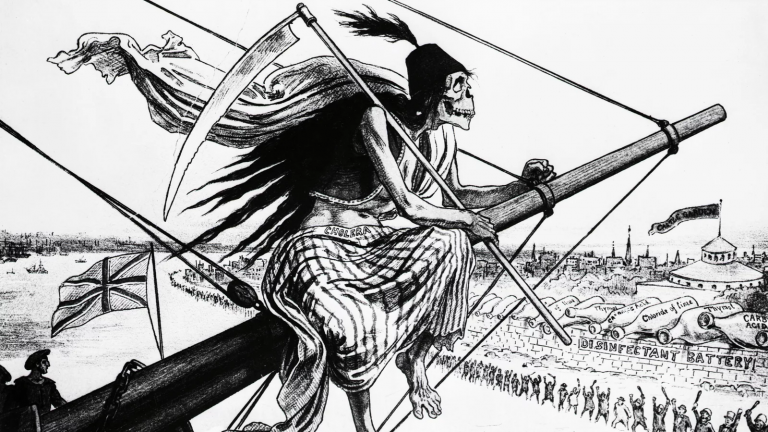NEW DATE! IAS Talking Points Seminar: 'Contagious Crossings'
12 January 2023, 6:00 pm–8:00 pm

Contagious Crossings: Representing Seafaring and Disease in Victorian Culture. With Dr Asha Hornsby (UCL). Respondents: Dr Charlotte Mathieson (University of Surrey) and Dr Jagjeet Lally (UCL). Chair: Professor Megan Vaughan (UCL).
This event is free.
Event Information
Open to
- All | UCL staff | UCL students | UCL alumni
Availability
- Yes
Cost
- Free
Organiser
-
Institute of Advanced Studies
Location
-
IAS Common GroundGround floor, South Wing, Wilkins BuildingLondonWC1E 6BTUnited Kingdom
PLEASE NOTE: This event has been postponed. It is no longer taking place on 24 November 2022. The new date is 12 January 2023.
In nineteenth-century Britain, the inclusion of a medical man in the ship’s company became a matter of course. But, in 1839, the Admiralty found ‘no candidate […] at all’ for the position of naval surgeon whereas the Army easily attracted ‘well qualified gentlemen’ to become field-surgeons. Reportedly, the widespread ‘feeling against the navy’ was due to it being considered ‘the very lowest grade of medical employment’. This was in spite of the fact that the role required serious aetiological research, particularly the mapping of ‘medical topographies’ and the study of foreign diseases. Although diaries and log-books record scrupulous ‘sweeping, scraping […], sprinkling & thorough swabbing’, alarming outbreaks in ports led to the imposition of controversial quarantine regulations. Sailing and sickness were further associated through lively debates between contagionists and miasmists conducted in the national press: was disease being imported as ‘a thing’, or, as the Spectator suggested, were the damp and cramped ships themselves ‘disease-manufactories’? Were the very voyages that bolstered Britain’s colonial power threatening to weaken her domestic vigour? Underappreciated and under-resourced naval surgeons seemed to be the last line of defence against public health catastrophe.
This paper reads first-hand accounts of Victorian ships’ doctors alongside representations of marine medicine in the nineteenth-century press. A literary-critical approach reveals how these accounts frequently combined aesthetic and epistemic elements and travelled repeatedly between the documentary and imaginary. This was vital in situating sailing vessels as ‘new’ and distinct sites of medico-scientific activity, and yet spaces which were anchored to landed discourses, particularly those relating to employment and public health. For instance, the Lancet, a medical journal dedicated to improving the naval surgeon’s lot, strikingly compared appalling crew-mortality rates to contemporaneous conditions of industrial employment. Similarly, non-medical journals imagined the conditions below deck to be akin to those in Britain’s expanding urban slums where outbreaks of cholera and typhoid were common. In short, marine medicine leaked and absorbed meanings into and from other social issues and reform movements in ways that have yet to be recognised. As well as tracing these connections, this paper suggests that the representational strategies used to express anxieties about disease containment and transmission shaped how aetiological knowledge was produced and understood.
Speaker
Dr Asha Hornsby
(Former Visiting Research Fellow IAS, UCL and Associate Lecturer in English at the University of St Andrews)
Respondents
Dr Charlotte Mathieson
(Lecturer in Nineteenth-Century English Literature, University of Surrey)
Dr Jagjeet Lally
(Associate Professor in the History of Early Modern and Modern India, UCL)
All welcome. Please follow this FAQ link for more information. All our events are free but you can support the IAS here.
 Close
Close

